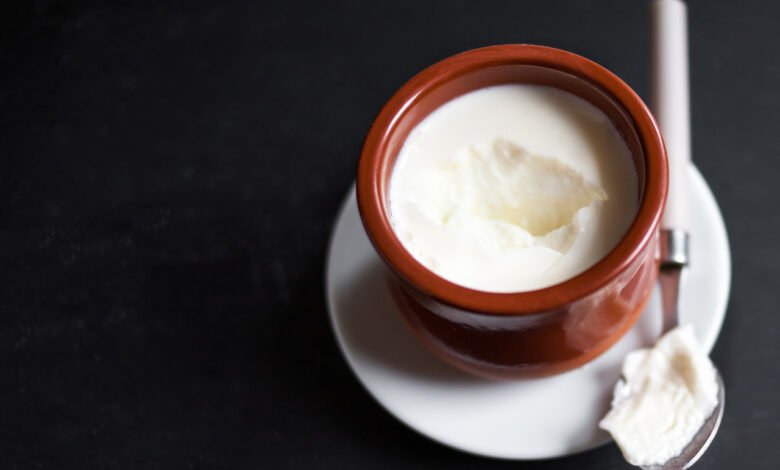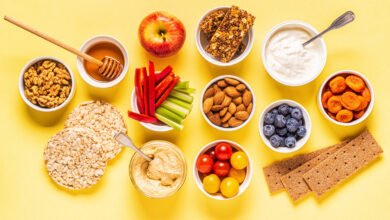Is Curd Good for Weight Loss? Let’s Find out

Curd, or dahi, is a mainstay in every Indian household, whether served with sizzling hot parathas or on its own after a meal. Can you even recall your mother forcing you to eat a mouthful of “curd” before you ran out the door to take the life-changing board exams?
In India, consuming curd with something sweet before leaving the house is considered auspicious. This practice enhances energy, calms the body, and relieves stress. Also beneficial to digestion.
It is also well-known for being an essential, easily accessible dietary item high in nutrients. As a result, it provides numerous health advantages.
However, many individuals still need to learn about another fantastic fact about curd. It is, in fact, a weight-loss superfood! Yes, it helps maintain our body weight by removing excess pounds.
So, let us look at how curd can help you lose weight. You can choose the best sort of curd for the best effects to make your weight loss journey smooth.
Curd for Weight Loss – The Basics
Fresh milk is curdled to make curd and left to stand at room temperature for at least 4 hours.
Curd is well-known for its excellent flavour and smooth, creamy texture. Aside from taste and texture, it serves a purpose in the human body and can provide numerous health benefits.
Including curd in a low-calorie weight reduction diet can help you lose more body fat and weight than a low-calorie diet with no protein or calcium.
In addition, it provides a flat stomach by assisting patients in losing stubborn fat pockets around the abdominal and waist areas.
Curd Benefits for Weight Loss
Below are the reasons for making curd a staple in your weight loss diet:
Enhances Digestion
A healthy metabolism is essential for weight loss. The proper digestion of meals prevents fat formation in your body. Probiotics are like soldiers who help in the breakdown of food particles.
Curd contains probiotic bacteria that help with digestion and nutrient absorption. One of the primary causes of weight gain is irregular waste disposal from our bodies, which can be caused by indigestion or an upset stomach.
According to a study, Lactobacillus bulgaricus, the bacterium found in curd, is responsible for shortening intestinal transit time. As a result, it allows waste to get expelled more quickly. In addition, it alleviates upset stomachs and boosts digestion.
Calcium Rich
The curd, like any other dairy product, is high in calcium. A bowl of curd contains a significant amount of calcium. It is responsible for healthy bones. Moreover, research shows dietary calcium is also necessary to protect you from gaining weight.
Calcium plays a vital role in keeping your BMI balanced. Consuming a cup of curd daily boosts the quantity of calcium in your body.
It reduces the release of cortisol, the “stress hormone” that encourages fat cells to build more fat around your belly. As a result, you maintain your weight better.
Protein Rich
Curd, unlike milk, is made through fermentation, which separates the milk solids from the liquid (known as whey). As a result, it makes curd more concentrated and higher in protein than milk.
Because proteins are more difficult to digest, the high protein content of curd is a factor for the slower digestion rate. In addition, it reduces the desire to consume more because it fills the stomach for extended periods.
According to a study, a high-protein diet naturally encourages you to consume fewer calories throughout the day. So you feel hungry less often and consume less calories. The protein composition of curd provides sufficient energy to the body.
According to another research, a high protein diet helps you create lean muscle mass, which allows you to burn more calories and lose weight.
Mineral Rich
Curd provides key minerals such as calcium, potassium, and magnesium and Vitamins such as Vit B 12 and B 2. All of these nutrients aid in the body’s overall development and growth.
As a result, blood pressure is better controlled. Moreover, minerals such as potassium and magnesium make it easier for surplus water in the cells to exit and swiftly reach the bladder.
Magnesium is vital for insulin function, especially in fat and overweight persons. It impacts how efficiently glucose gets stored in the body as energy. If you keep your magnesium levels under control, you do not have to worry about belly fat.
Lactose-Free
Regarding weight loss, including milk in your diet would benefit your low-fat dietary habits. Nevertheless, the presence of lactose in milk makes it difficult to include it in the diet of a lactose-sensitive person.
Curd, on the other hand, is prepared by fermenting milk with bacteria called Lactobacillus bulgaricus. It converts the lactose in milk into lactic acid, making it suitable for lactose-intolerant people.
The HealthifyMe Note
Curd, also known as dahi in Indian households, is a staple:
- It is a powerful fat burner with a lot of calcium. As a result, it helps keep your BMI in balance.
- Curd contains probiotics, which regulate the digestive tract and enhance metabolism. As a result, it improves the weight loss process.
- Curd’s protein content keeps you full for an extended period, preventing irregular appetite. A bowl of curd is always an excellent choice as part of a nutritious diet.
- It helps to improve general well-being.
How to Choose the Right Type of Curd?
Looking around the market, you notice numerous varieties of this simple food item. So, which of them can assist you in losing excess body weight? Also, do you know what kind of curd to eat to acquire a slim, trim figure?
The following are the tricks:
- Greek yoghurt is the finest option for weight loss. It has only 90 calories and very little sugar, making it highly nutritious for your body and extremely beneficial for losing weight. Aside from Greek yoghurt, curd varieties have no more than 130 calories or 1 gram of fat per serving. These are also excellent for controlling your body weight.
- Choose with caution the low-calorie, low-fat curd types available on the market . They appear to be the healthier option. However, are laden with sugar and artificial sweeteners. Some may even contain corn syrup, which is unsuitable for weight loss due to its high fructose content.
- While focused on calories, remember to check the protein contents of curds. A low-calorie curd must have at least 12 to 15 grams of protein to keep you satisfied for an extended time.
- Homemade low-fat curd prepared from cow’s milk rather than buffalo’s milk is also very healthful and beneficial for weight loss.
- If you enjoy fruit-flavoured curds, pick fruits that are low in calories.
- Curd’s calcium and vitamin D levels might vary significantly between brands. It mainly depends on the processing, so check the label before purchasing.
Ways to Include Curd in Your Weight Loss Diet
This delicacy can be enjoyed in various ways depending on your preferences. Here are some healthy ways to incorporate curd:
Plain Curd
Through the day, a medium bowl of plain curd can be consumed with the meal or as a snack. You can also add a sprinkle of cinnamon on top for a yummy curd snack!
Combine it with Your Overnight Oats
If you enjoy oatmeal for breakfast, try overnight oats with yoghurt instead. Simply combine your preferred amount of oats with a cup of curd at night and enjoy in the morning with your fruit OR half a fistful of mixed nuts or even 1 tbsp of trail mix as toppings..
It could be a more nutritious alternative to a typical breakfast. Top a cup of curd with 1-2 tbsp of whole grain granola or a medium sized seasonal fruit for breakfast or lunch.
Make a Nutritious Dip
Prepare a healthy dip using curd, mint, coriander, or other ingredients, or replace mayonnaise with low-fat curd as needed.
Make Some Froyo
Blend some fruits with yoghurt and sweeten with 1 tsp of honey or jaggery if desired.
After a few hours in the fridge, you can have a delightful frozen yoghurt. It is a guilt-free, nutritious, homemade, low-calorie alternative to ice cream.
Chhach or Chaas, As Well As Lassi
Every Indian home has a “go-to” beverage. A glass after a meal or instead of a snack can help you avoid consuming junk food.
Blend it Into Your Smoothie Bowl
Make a smoothie with your favourite fruits and replace the milk with creamy curd. This results in a much richer and more satisfying smoothie.
When is The Ideal Time to Consume Curd for Weight Loss?
One should consume curd at least three times a day. However, it would help if you ate curd any time of day and with any meal, so consider including it in your morning or lunch.
Eating curd during the day will help you feel satisfied longer and reduce junk food consumption, which can help you better manage body weight. It’s a versatile product that has more benefit than harm to the body..
Curd is a healthy and nutritious food that can help you lose weight. Consider including this in your diet to assist you in achieving your goals.
However, keep in mind that one food only works for some. As a result, it is best to consult with a nutritionist. To acquire a customised weight loss strategy for your health goals, you can consult a professional nutritionist at HealthifyMe.
Other Benefits of Consuming Curd
This simple food item curd is packed with several nutrients and helps increase your body’s health benefits.
It Improves Immunity.
Curd contains diverse nutrients, including probiotics, minerals, and vitamins. These nutrients are in charge of enhancing immunity. In addition, curd contains healthy bacteria, often known as probiotics, which help strengthen your immune system and improve your health.
Probiotics, like microbes, help the body fight viral and bacterial illnesses and keep you healthy. Thus, increased immunity helps the body fight against the common cold, flu, and other infections. Magnesium, selenium, vitamin D, and zinc are the primary minerals that help enhance immunity.
Improves Bone and Teeth Health
Do you know why curd is the finest option for improving bone and tooth health? It contains calcium and phosphorus. Calcium is essential for our bones and teeth, and curd is an excellent source of calcium and teeth.
According to one study, eating curd everyday meets your daily calcium requirement to a large extent improving bone strength. As a result, it lowers your risk of developing arthritis, osteoporosis, tooth decay, weakened gums, etc.
Reduces Blood Sugar Levels
Curd is abundant in protein and can find linkages to lower blood sugar levels. Many studies suggest curd can help reduce insulin resistance and blood glucose levels.
As a result, it aids in preventing heart disease and diabetes. Additionally, the Glycemic Index (GI) and Glycemic Load (GL) of curd helps lower blood sugar levels.
Beneficial to Vaginal Health
Curd is one of the few foods that are beneficial to vaginal health. Also, curd can potentially maintain pH levels by balancing acid levels in the body.
According to research, a normal pH level keeps the vagina healthy and prevents disorders such as irritation and vaginal burning.
Conclusion
Curd is a superfood that increases the nutritional value of your meal while also enhancing the overall flavour of dishes. As a good source of calcium, protein, and probiotics, it has been praised as a tool for weight loss and may improve your health when consumed daily.
This simple home food is a treasure trove of multiple advantages influencing heart health, immunity, digestion, bone health, skin and hair health, sugar levels, weight, and more. However, choose your yoghurt with caution. Opt for plain, unsweetened varieties with probiotics for optimal health advantages.
Frequently Asked Questions (FAQs)
Q. How much curd is good for weight loss?
A. A cup or two of curd a day increases calcium levels in the body, which inhibits cortisol release and aids in weight loss. Furthermore, curd preserves one-third of lean muscle mass, allowing you to maintain your figure after losing weight for longer.
Q. Does curd reduce belly fat?
A. Curd is high in protein and low in carbohydrates, making it an excellent weight-loss diet. Moreover, when you lose more belly fat, the protein in it helps you keep lean muscle mass.
Q. What happens if you eat curd daily?
A. Eating curd daily helps to lower cholesterol levels, reducing the risk of high blood pressure and hypertension and maintaining a healthy weight and heart.
Q. Can I eat curd at night for weight loss?
A. This is a matter of your health. If you are not prone to colds, sinus infections and other cold related health issues, yes, you can have a medium sized bowl of curds at night.
Q. What is the best time for eating curd?
A. One can eat curd at any time, whether for breakfast, lunch, or dinner. However, it would help if you did not eat curd at night in case you feel bloated or have a tendency to catch a cold. On the other hand, people who do not have a cold or a cough can eat curd anytime or at night.
Q. Which is better for weight loss, curd or milk?
A. Milk and curd have equal calorie counts. Curd however, contains probiotics, which adds beneficial bacteria to the digestive tract. A healthy gut is directly proportional to good digestion and thus overall health. As a result, curd may have an advantage over milk when it comes to better weight management.
Q. What are the disadvantages of eating curd?
A. Excess curd (made from whole milk and not low-fat/ skimmed or toned milk) consumption may result in weight gain rather than weight loss. It is a typical curd side effect. When consumed over the recommended amount, it may worsen constipation rather than strengthen your digestive tract.
Q. Does curd remove gas?
A. Hydrochloric acid produces acidity when the curd gets consumed on an empty stomach. It kills the beneficial lactobacillus bacteria and creates stomach problems.
Q. Who should avoid eating curd?
A. You must be mindful of how much curd you consume each day. You should avoid overeating curd if you have a weak digestive system. It has the potential to cause constipation. Curd should not be consumed daily by people who have arthritis. Curd is a sour dish, and sour foods link to increased joint pain. Lactose-intolerant individuals may digest curd but not milk. However, you should limit your curd consumption to 1 or 2 medium sized katoris a day..
The Supporting Reference
1. Mazloom K, Siddiqi I, Covasa M. Probiotics: How Effective Are They in the Fight Against Obesity? Nutrients. 2019 Jan 24;11(2):258. doi: 10.3390/nu11020258. PMID: 30678355; PMCID: PMC6412733.
https://www.ncbi.nlm.nih.gov/pmc/articles/PMC6412733/
2. Zhang F, Ye J, Zhu X, Wang L, Gao P, Shu G, Jiang Q, Wang S. Anti-Obesity Effects of Dietary Calcium: The Evidence and Possible Mechanisms. Int J Mol Sci. 2019 Jun 23;20(12):3072. doi: 10.3390/ijms20123072. PMID: 31234600; PMCID: PMC6627166.
https://www.ncbi.nlm.nih.gov/pmc/articles/PMC6627166/
3. Leidy HJ, Tang M, Armstrong CL, Martin CB, Campbell WW. The effects of consuming frequent, higher protein meals on appetite and satiety during weight loss in overweight/obese men. Obesity (Silver Spring). 2011 Apr;19(4):818-24. doi: 10.1038/oby.2010.203. Epub 2010 Sep 16. PMID: 20847729; PMCID: PMC4564867.
https://pubmed.ncbi.nlm.nih.gov/20847729/
4. Pesta DH, Samuel VT. A high-protein diet for reducing body fat: mechanisms and possible caveats. Nutr Metab (Lond). 2014 Nov 19;11(1):53. Doi: 10.1186/1743-7075-11-53. PMID: 25489333; PMCID: PMC4258944.
https://www.ncbi.nlm.nih.gov/pmc/articles/PMC4258944/
5. Cormick G, Belizán JM. Calcium Intake and Health. Nutrients. 2019 Jul 15;11(7):1606. doi: 10.3390/nu11071606. PMID: 31311164; PMCID: PMC6683260.
https://www.ncbi.nlm.nih.gov/pmc/articles/PMC6683260/
6. Watanabe D, Kuranuki S, Sunto A, Matsumoto N, Nakamura T. Daily Yogurt Consumption Improves Glucose Metabolism and Insulin Sensitivity in Young Nondiabetic Japanese Subjects with Type-2 Diabetes Risk Alleles. Nutrients. 2018 Nov 29;10(12):1834. doi: 10.3390/nu10121834. PMID: 30501031; PMCID: PMC6316314.
https://www.ncbi.nlm.nih.gov/pmc/articles/PMC6316314/
7. Lin YP, Chen WC, Cheng CM, Shen CJ. Vaginal pH Value for Clinical Diagnosis and Treatment of Common Vaginitis. Diagnostics (Basel). 2021 Oct 27;11(11):1996. doi: 10.3390/diagnostics11111996. PMID: 34829343; PMCID: PMC8618584.




